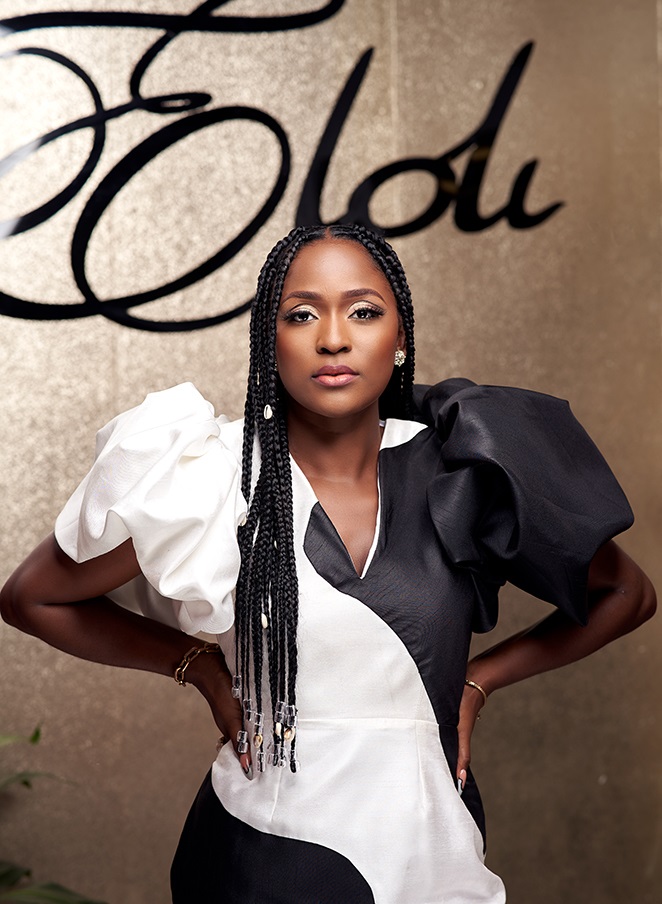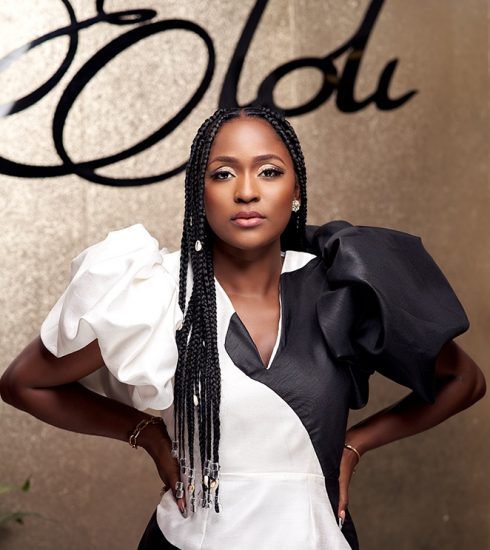Kibonen Nfi, Fashion Designer

Every Designer has their concepts their stories, their niche, and their following. I don’t have any complexes vis-à-vis other designers. I stay focused and confident.
KM: Describe the Kibonen brand and the inspiration behind your creations
KN: My brand is a fusion of African aesthetics with modern styles and trends to suit the lifestyle of a Global Citizen. My inspiration comes from “Toghu” – a colorful, intricate embroidery done in various symbols with wool on the garments of the royalty from the Northwest Region of Cameroon. Japanese influences are alive in my design fusion as well. My brand aims to harness our cultural heritage and bring it to a place where it transforms mindsets, builds confidence and integrity, creates jobs, and develops the fashion value chain in my community.
KM: You started as KiRette Couture, how come this brand no longer exists?
KN: KiRette Couture was a baby brand contracted by the Ministry of Culture to produce garments for the 2010 world cup delegation going to South Africa. We delivered products but never got paid. This led to financial problems making it difficult to continue a brand still in its infancy.
KM: You started as KiRette Couture, how come this brand no longer exists?
KN: KiRette Couture was a baby brand contracted by the Ministry of Culture to produce garments for the 2010 world cup delegation going to South Africa. We delivered products but never got paid. This led to financial problems making it difficult to continue a brand still in its infancy.
KM: How did you get selected for New York Fashion Week (NYFW) 2022?
KN: I did NYFW when I was a student in fashion school. The circumstances were competitive, but my brand stood out, so the myth had been broken. It was a great honor to be selected as a Designer in Residence by Berkeley College to participate in NYFW 2022. It was a tribute to celebrating the influence of African fashion on American lifestyle. This innovative and educative program was very beneficial.
KM: What would it take to create a “REAL” Cameroon Fashion Week?
KN: It takes a lot to put on an effective fashion week that will yield the results needed to advance the industry. Fashion is an expensive and intricate industry and must be treated as a business. I see loads of fashion shows in Cameroon done for entertainment purposes, not industry driven; this devalues the designers. If designers and fashion experts work together, with the proper support, resources, and infrastructure, we can create a successful Cameroon Fashion Week.
KM: How do we transform Cameroon’s rich culture to be synonymous with African fashion?
KN: We need innovative designers and educated consumers. Cameroonians need to consume the products of their designers, and it starts with loving ourselves and having confidence in ourselves. Cameroonians leaned on Nigerian culture for a while, but it is gradually changing. We need to be more intentional in our decisions to support this industry. I believe we are getting there.

Toghu” has come to stay
KM: The “Toghu” Design is popular worldwide. How can it be sustained, so it does not become a fad?
KN: When I started using “Toghu” in 2009, I deliberately made it mainstream and international. When celebrities started wearing the designs, it became eminent that this was not a fad. However, we have not explored a quarter of the designs that can come from it. We have a long way to go.
KM: How is your tailoring formation school managed in your absence?
KN: Cameroon Clothing Company produces apparel, uniforms, and garments for the Kibonen Brand and other designers. Our train-to-hire program trains skilled and unskilled employees and equips them with skills to use in the business of fashion. I am neither a trainer nor a seamstress, so everyone carries out their duties effectively, and I oversee everything.
KM: How can the government assist in the development of the fashion industry?
KN: The government needs to embark on intentional initiatives to create sustainable development. There is a lot of ignorance in this field as it is stereotyped as a profession for the uneducated. I will advise them to invest resources and get industry experts to help with its development.
KM: Despite the industry challenges, you decided to invest in Cameroon. Why?
KN: Coming to Cameroon was an assignment from God, and I take it as a personal experience to fulfill that purpose. My focus is to shed light on this obscure industry, build confidence, and create opportunities for Cameroonians.
KM: What is your biggest achievement as a fashion designer?
KN: Dressing Lupita Nyong’o. She chooses from over 2000 designer outfits. Picking two companies from my selection of renowned designers, like Chanel and Fendi, was an outstanding achievement.
KM: What is your message to young Cameroonian designers?
KN: They should do their research, develop their brand, be able to articulate and explain their uniqueness, and find a mentor and an investor who believes in their brand. They should not belong to the pool of half-baked “designers.”


KM: What are you goals in the next 5 years?
KN: I intend for the Kibonen brand to be department stores around the world.

 Download
Download 














